Text
Snapchat Ads allow businesses to promote their products and services through various ad formats like Snap Ads, Story Ads, and Filters. These ads are important for engaging a younger audience and leveraging the platform's interactive features. Benefits include high engagement rates, creative ad formats, and precise targeting options. Effective use involves creating engaging content, understanding the platform's unique features, and continuously monitoring ad performance for optimization.
For more details, you can check out the full article here.
#snapchat ads#snapchat advertising#snap ads#ad for snapchat#ad campaign#m arketing#fo llow#advertising marketing
0 notes
Text
Elevate Your Brand with Dynamic Kiosk Advertising in Mumbai
Enhance your brand visibility in the bustling city of Mumbai with impactful Pole Kiosk Advertising. Reach your target audience effectively through strategically placed kiosks, capturing attention and driving engagement. Our Mumbai-based advertising services ensure maximum exposure for your brand, leveraging prime locations to amplify your message. Elevate your marketing strategy with our expertly crafted Pole Kiosk Advertising solutions, connecting your brand with the vibrant pulse of Mumbai. Attract, engage, and leave a lasting impression with our innovative advertising approach. Boost your brand recognition today with our tailored Pole Kiosk Advertising services in the dynamic landscape of Mumbai.
To Know More: https://www.universalmediaa.com/services/pole-kiosk-advertising-in-mumbai
0 notes
Text
DIGITAL MARKETING AGENCY
-
"The Art of Digital Marketing: Crafting Success in the Digital Age"
In today's fast-paced digital landscape, businesses are racing to carve out their digital footprint. Digital marketing has emerged as the go-to strategy for brand visibility, customer engagement, and growth. It's an art that blends creativity and strategy, where every click, like, and share is a brushstroke on the canvas of success.
Creative Expressions
Digital marketing is, at its core, a canvas for creative expression. In a world saturated with information, it's the creative spark that catches the eye and makes a brand memorable. Whether it's a visually stunning website, a witty social media post, or a captivating video, creativity is the cornerstone of digital marketing and advertising marketing.
Consider the power of storytelling in content creation. It's not merely about showcasing products; it's about narrating a story that resonates with the audience. It's about addressing their needs and desires in a visually appealing and emotionally engaging manner.
Connecting with Your Audience
But digital marketing isn't just about creating beautiful content; it's about forging meaningful connections with your audience. It's about understanding their pain points, aspirations, and preferences. It's the art of empathy in a digital realm.
Imagine a boutique coffee shop's Instagram feed. Instead of just posting images of coffee cups, they share stories of the farmers who grow their beans, the local artists who decorate their space, and the customers who find solace in their café. It's a heartfelt narrative that resonates with followers, fostering a sense of community.
Strategic Targeting
While creativity is vital, effective digital marketing is also highly strategic. It involves precision targeting to ensure that your message reaches the right audience at the right time. It's about making data-informed decisions to maximize your impact.
Consider an e-commerce store's Facebook ad campaign. By analyzing user data and behavior, they can deliver tailored ads to individuals who have shown interest in similar products. This strategic approach increases the likelihood of conversions and maximizes their return on investment.
The Marriage of Art and Strategy
In the world of digital marketing, it's not a choice between creativity and strategy; it's the harmonious marriage of the two that yields the best results. Creativity sparks engagement, while strategic targeting ensures that engagement translates into tangible outcomes.
Imagine a start-up launching its maiden digital marketing campaign. They craft visually stunning ads and use data-driven insights to target their audience effectively. As the campaign progresses, they monitor its performance closely, making adjustments to SEO optimize results. The fusion of creativity and strategy ensures their campaign not only captures attention but also delivers on its objectives.
In Conclusion
Digital marketing is a captivating journey where creativity and strategy intertwine. It's about crafting compelling narratives, forging meaningful connections, and using data to refine your approach. It's the art of shining in the digital spotlight, and those who master this balance are poised for success in the digital age.
0 notes
Text
This might seem like an "old man yells at cloud" situation, but it's just wild growing up and being told how dangerous distracted driving is - how, at highway speeds, you can traverse the length of a football field (100 yards, 91 meters) in a matter of seconds - how one split second sending a text while driving could result in a potential fatal crash, and then getting on the road as a driver and being surrounded by billboards. Their entire purpose is to catch one's attention, so they're lining major roads, which tend to be highways. How is it that you're told how important it is to never be distracted while driving, but still being advertised to?
At best, this type of advertising is an eyesore to pedestrians and motorists and a general waste of electricity to light it, and at worst, it is an active danger considering they are there to advertise and therefore, must catch people's attention.
I'm not even against advertising in theory, but this particular mode bothers me so much and I hate how pervasive it is - especially in large cities or highways.
#politics#i don't know much about são paulo banning marketing billboards but on paper i want that here in the USA#as a motorist it at best just makes me more anxious driving in those larger cities because i want to FOCUS ON THE ROAD#and passing 5000 billboards per mile isn't helping actually!#i've gotten good at filtering that out of my FOV but it's still fucking exhausting lol#i especially hate those modern electric billboards. despise them actually#i am aware that advertising is a critical aspect to business management in some cases...#...but it shouldn't risk the safety of the populous for you to advertise to them and i see things like billboards as risking safety...#...i feel similarly about online advertising in that so much of it risks internet user's safety...#...such as flashing ads online which risk triggering epileptic seizures in light/photo-sensitive folks#distracted driving (texting): NO >:( || distracted driving (being advertised to): YAYYYY :D#i've been driving on my own for a few years now and i've been thinking about this for ENTIRELY too long
3K notes
·
View notes
Text

PFTDGEHSJSJDYTE I CANT BELIEVE MONKEY D. LUFFY HAS TAKEN OVER TUMBLR!!!
At first sight I was like, oh cool! I see they’ve added a Luffy tab on my dashboard, because I love one piece. And then I look down the luffy tag,,, AND THERE ARE SO MANY PEOPLE WHO JUST. DON’T KNOW WHO HE IS XD. That must mean THEY’VE JUST ADDED HIM TO EVERYONE’S DASHBOARDS WAHAHAHA!
First of all, it’s pronounced loo-fee. Second of all, he’s from hit series One Piece and you better not forget it!!!
#one piece#op fanart#monkey d. luffy#Luffy#<<<< hes taking over tumblr… LUFFY SWEEP LUFFY SWEEP#edit: oughth nooo its less fun if its related to netflix paid marketing T ^ T#i thought some funky one piece fan moderator just got a lil silly... not capitalism!!1!1!1!#edit edit: I hope this doesnt breach containment… but to any non-one piece enjoyers… we one piece fans also dont condone this advertising!!#edit edit edit: ITS CHANGED TO ZORO I KNOW I KNOW I KNOOOWWWW T ^ T!!!!
5K notes
·
View notes
Text

#I'll be a skibidi toilet defender until the day i die idc#it's one of the few pieces of media that gen alpha enjoys that isn't taking advantage of them for advertising or marketing purposes#it's just an indie animation made by some guy and I'd take it over shit like cocomelon that's purposely overstimulating children for profit#the legend of zelda#loz#tloz#ganondorf#good advice ganondorf#good advice#young zelda#princess Zelda#link#young link#skibidi toilet
806 notes
·
View notes
Text
UK publishers suing Google for $17.4b over rigged ad markets
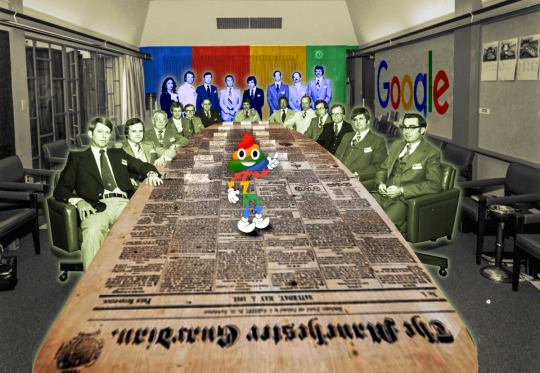
THIS WEEKEND (June 7–9), I'm in AMHERST, NEW YORK to keynote the 25th Annual Media Ecology Association Convention and accept the Neil Postman Award for Career Achievement in Public Intellectual Activity.

Look, no one wants to kick Big Tech to the curb more than I do, but, also: it's good that Google indexes the news so people can find it, and it's good that Facebook provides forums where people can talk about the news.
It's not news if you can't find it. It's not news if you can't talk about it. We don't call information you can't find or discuss "news" – we call it "secrets."
And yet, the most popular – and widely deployed – anti-Big Tech tactic promulgated by the news industry and supported by many of my fellow trustbusters is premised on making Big Tech pay to index the news and/or provide a forum to discuss news articles. These "news bargaining codes" (or, less charitably, "link taxes") have been mooted or introduced in the EU, France, Spain, Australia, and Canada. There are proposals to introduce these in the US (through the JCPA) and in California (the CJPA).
These US bills are probably dead on arrival, for reasons that can be easily understood by the Canadian experience with them. After Canada introduced Bill C-18 – its own news bargaining code – Meta did exactly what it had done in many other places where this had been tried: blocked all news from Facebook, Instagram, Threads, and other Meta properties.
This has been a disaster for the news industry and a disaster for Canadians' ability to discuss the news. Oh, it makes Meta look like assholes, too, but Meta is the poster child for "too big to care" and is palpably indifferent to the PR costs of this boycott.
Frustrated lawmakers are now trying to figure out what to do next. The most common proposal is to order Meta to carry the news. Canadians should be worried about this, because the next government will almost certainly be helmed by the far-right conspiratorialist culture warrior Pierre Poilievre, who will doubtless use this power to order Facebook to platform "news sites" to give prominence to Canada's rotten bushel of crypto-fascist (and openly fascist) "news" sites.
Americans should worry about this too. A Donald Trump 2028 presidency combined with a must-carry rule for news would see Trump's cabinet appointees deciding what is (and is not) news, and ordering large social media platforms to cram the Daily Caller (or, you know, the Daily Stormer) into our eyeballs.
But there's another, more fundamental reason that must-carry is incompatible with the American system: the First Amendment. The government simply can't issue a blanket legal order to platforms requiring them to carry certain speech. They can strongly encourage it. A court can order limited compelled speech (say, a retraction following a finding of libel). Under emergency conditions, the government might be able to compel the transmission of urgent messages. But there's just no way the First Amendment can be squared with a blanket, ongoing order issued by the government to communications platforms requiring them to reproduce, and make available, everything published by some collection of their favorite news outlets.
This might also be illegal in Canada, but it's harder to be definitive. The Canadian Charter of Rights and Freedoms was enshrined in 1982, and Canada's Supreme Court is still figuring out what it means. Section Two of the Charter enshrines a free expression right, but it's worded in less absolute terms than the First Amendment, and that's deliberate. During the debate over the wording of the Charter, Canadian scholars and policymakers specifically invoked problems with First Amendment absolutism and tried to chart a middle course between strong protections for free expression and problems with the First Amendment's brook-no-exceptions language.
So maybe Canada's Supreme Court would find a must-carry order to Meta to be a violation of the Charter, but it's hard to say for sure. The Charter is both young and ambiguous, so it's harder to be definitive about what it would say about this hypothetical. But when it comes to the US and the First Amendment, that's categorically untrue. The US Constitution is centuries older than the Canadian Charter, and the First Amendment is extremely definitive, and there are reams of precedent interpreting it. The JPCA and CJPA are totally incompatible with the US Constitution. Passing them isn't as silly as passing a law declaring that Pi equals three or that water isn't wet, but it's in the neighborhood.
But all that isn't to say that the news industry shouldn't be attacking Big Tech. Far from it. Big Tech compulsively steals from the news!
But what Big Tech steals from the news isn't content.
It's money.
Big Tech steals money from the news. Take social media: when a news outlet invests in building a subscriber base on a social media platform, they're giving that platform a stick to beat them with. The more subscribers you have on social media, the more you'll be willing to pay to reach those subscribers, and the more incentive there is for the platform to suppress the reach of your articles unless you pay to "boost" your content.
This is plainly fraudulent. When I sign up to follow a news outlet on a social media site, I'm telling the platform to show me the things the news outlet publishes. When the platform uses that subscription as the basis for a blackmail plot, holding my desire to read the news to ransom, they are breaking their implied promise to me to show me the things I asked to see:
https://www.eff.org/deeplinks/2023/06/save-news-we-need-end-end-web
This is stealing money from the news. It's the definition of an "unfair method of competition." Article 5 of the Federal Trade Commission Act gives the FTC the power to step in and ban this practice, and they should:
https://pluralistic.net/2023/01/10/the-courage-to-govern/#whos-in-charge
Big Tech also steals money from the news via the App Tax: the 30% rake that the mobile OS duopoly (Apple/Google) requires for every in-app purchase (Apple/Google also have policies that punish app vendors who take you to the web to make payments without paying the App Tax). 30% out of every subscriber dollar sent via an app is highway robbery! By contrast, the hyperconcentrated, price-gouging payment processing cartel charges 2-5% – about a tenth of the Big Tech tax. This is Big Tech stealing money from the news:
https://www.eff.org/deeplinks/2023/06/save-news-we-must-open-app-stores
Finally, Big Tech steals money by monopolizing the ad market. The Google-Meta ad duopoly takes 51% out of every ad-dollar spent. The historic share going to advertising "intermediaries" is 10-15%. In other words, Google/Meta cornered the market on ads and then tripled the bite they were taking out of publishers' advertising revenue. They even have an illegal, collusive arrangement to rig this market, codenamed "Jedi Blue":
https://en.wikipedia.org/wiki/Jedi_Blue
There's two ways to unrig the ad market, and we should do both of them.
First, we should trustbust both Google and Meta and force them to sell off parts of their advertising businesses. Currently, both Google and Meta operate a "full stack" of ad services. They have an arm that represents advertisers buying space for ads. Another arm represents publishers selling space to advertisers. A third arm operates the marketplace where these sales take place. All three arms collect fees. On top of that: Google/Meta are both publishers and advertisers, competing with their own customers!
This is as if you were in court for a divorce and you discovered that the same lawyer representing your soon-to-be ex was also representing you…while serving as the judge…and trying to match with you both on Tinder. It shouldn't surprise you if at the end of that divorce, the court ruled that the family home should go to the lawyer.
So yeah, we should break up ad-tech:
https://www.eff.org/deeplinks/2023/05/save-news-we-must-shatter-ad-tech
Also: we should ban surveillance advertising. Surveillance advertising gives ad-tech companies a permanent advantage over publishers. Ad-tech will always know more about readers' behavior than publishers do, because Big Tech engages in continuous, highly invasive surveillance of every internet user in the world. Surveillance ads perform a little better than "content-based ads" (ads sold based on the content of a web-page, not the behavior of the person looking at the page), but publishers will always know more about their content than ad-tech does. That means that even if content-based ads command a slightly lower price than surveillance ads, a much larger share of that payment will go to publishers:
https://www.eff.org/deeplinks/2023/05/save-news-we-must-ban-surveillance-advertising
Banning surveillance advertising isn't just good business, it's good politics. The potential coalition for banning surveillance ads is everyone who is harmed by commercial surveillance. That's a coalition that's orders of magnitude larger than the pool of people who merely care about fairness in the ad/news industries. It's everyone who's worried about their grandparents being brainwashed on Facebook, or their teens becoming anorexic because of Instagram. It includes people angry about deepfake porn, and people angry about Black Lives Matter protesters' identities being handed to the cops by Google (see also: Jan 6 insurrectionists).
It also includes everyone who discovers that they're paying higher prices because a vendor is using surveillance data to determine how much they'll pay – like when McDonald's raises the price of your "meal deal" on your payday, based on the assumption that you will spend more when your bank account is at its highest monthly level:
https://pluralistic.net/2024/06/05/your-price-named/#privacy-first-again
Attacking Big Tech for stealing money is much smarter than pretending that the problem is Big Tech stealing content. We want Big Tech to make the news easy to find and discuss. We just want them to stop pocketing 30 cents out of every subscriber dollar and 51 cents out of ever ad dollar, and ransoming subscribers' social media subscriptions to extort publishers.
And there's amazing news on this front: a consortium of UK web-publishers called Ad Tech Collective Action has just triumphed in a high-stakes proceeding, and can now go ahead with a suit against Google, seeking damages of GBP13.6b ($17.4b) for the rigged ad-tech market:
https://www.reuters.com/technology/17-bln-uk-adtech-lawsuit-against-google-can-go-ahead-tribunal-rules-2024-06-05/
The ruling, from the Competition Appeal Tribunal, paves the way for a frontal assault on the thing Big Tech actually steals from publishers: money, not content.
This is exactly what publishing should be doing. Targeting the method by which tech steals from the news is a benefit to all kinds of news organizations, including the independent, journalist-owned publishers that are doing the best news work today. These independents do not have the same interests as corporate news, which is dominated by hedge funds and private equity raiders, who have spent decades buying up and hollowing out news outlets, and blaming the resulting decline in readership and profits on Craiglist.
You can read more about Big Finance's raid on the news in Margot Susca's Hedged: How Private Investment Funds Helped Destroy American Newspapers and Undermine Democracy:
https://www.press.uillinois.edu/books/?id=p087561
You can also watch/listen to Adam Conover's excellent interview with Susca:
https://www.youtube.com/watch?v=N21YfWy0-bA
Frankly, the looters and billionaires who bought and gutted our great papers are no more interested in the health of the news industry or democracy than Big Tech is. We should care about the news and the workers who produce the news, not the profits of the hedge-funds that own the news. An assault on Big Tech's monetary theft levels the playing field, making it easier for news workers and indies to compete directly with financialized news outlets and billionaire playthings, by letting indies keep more of every ad-dollar and more of every subscriber-dollar – and to reach their subscribers without paying ransom to social media.
Ending monetary theft – rather than licensing news search and discussion – is something that workers are far more interested in than their bosses. Any time you see workers and their bosses on the same side as a fight against Big Tech, you should look more closely. Bosses are not on their workers' side. If bosses get more money out of Big Tech, they will not share those gains with workers unless someone forces them to.
That's where antitrust comes in. Antitrust is designed to strike at power, and enforcers have broad authority to blunt the power of corporate juggernauts. Remember Article 5 of the FTC Act, the one that lets the FTC block "unfair methods of competition?" FTC Chair Lina Khan has proposed using it to regulate training AI, specifically to craft rules that address the labor and privacy issues with AI:
https://www.youtube.com/watch?v=3mh8Z5pcJpg
This is an approach that can put creative workers where they belong, in a coalition with other workers, rather than with their bosses. The copyright approach to curbing AI training is beloved of the same media companies that are eagerly screwing their workers. If we manage to make copyright – a transferrable right that a worker can be forced to turn over their employer – into the system that regulates AI training, it won't stop training. It'll just trigger every entertainment company changing their boilerplate contract so that creative workers have to sign over their AI rights or be shown the door:
https://pluralistic.net/2024/05/13/spooky-action-at-a-close-up/#invisible-hand
Then those same entertainment and news companies will train AI models and try to fire most of their workers and slash the pay of the remainder using those models' output. Using copyright to regulate AI training makes changes to who gets to benefit from workers' misery, shifting some of our stolen wages from AI companies to entertainment companies. But it won't stop them from ruining our lives.
By contrast, focusing on actual labor rights – say, through an FTCA 5 rulemaking – has the potential to protect those rights from all parties, and puts us on the same side as call-center workers, train drivers, radiologists and anyone else whose wages are being targeted by AI companies and their customers.
Policy fights are a recurring monkey's paw nightmare in which we try to do something to fight corruption and bullying, only to be outmaneuvered by corrupt bullies. Making good policy is no guarantee of a good outcome, but it sure helps – and good policy starts with targeting the thing you want to fix. If we're worried that news is being financially starved by Big Tech, then we should go after the money, not the links.

If you'd like an essay-formatted version of this post to read or share, here's a link to it on pluralistic.net, my surveillance-free, ad-free, tracker-free blog:
https://pluralistic.net/2024/06/06/stealing-money-not-content/#content-free
#pluralistic#competition#advertising#surveillance advertising#saving the news from big tech#link taxes#trustbusting#competition and markets authority#uk#ukpoli#Ad Tech Collective Action#digital markets unit#Competition Appeal Tribunal
584 notes
·
View notes
Text
Kickstarter Countdown Begins!

Your friendly student body president is here to remind you that our Kickstarter for Keyframes is set to launch in two weeks!
For the next fortnight (hah) we will be dropping teasers of the merch for the KS, and some really cool art collabs from artists that the team looks up to. Assss well as a little something something with a dope indie studio.
If you have any questions about the KS, don't hesitate to drop it in our inbox andddd we'll get to answering those as soon as we can!
Otherwise, look forward to the upcoming days with us!
(BLANK) House
[ ◉ ¯]
Art by Red Pen
Follow our Kickstarter pre-launch page HERE!
#keyframes vn#kf announcements!#blank house announcements#chewable chibi#me using the excuse of marketing to commission artists we adore#THE PERKS OF HAVING A STUDIO AND A GAME TO ADVERTISE HAHA#in what might be the first time in history I am excited to do some marketing haha
229 notes
·
View notes
Text
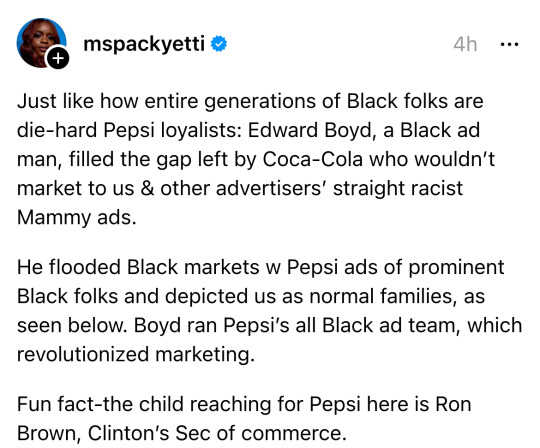
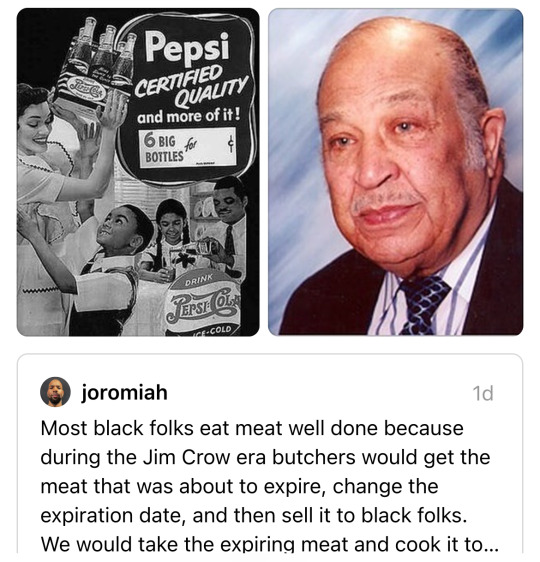

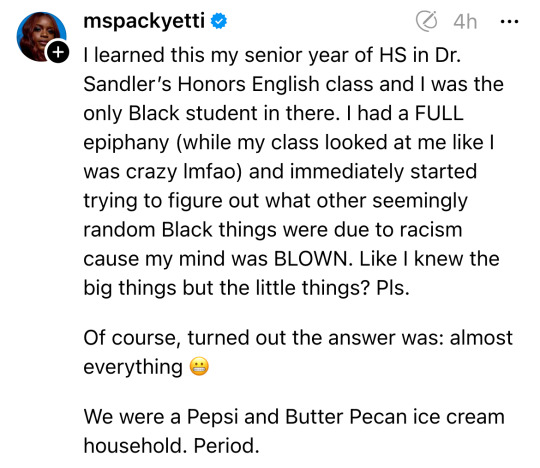


#Pepsi#Coca-Cola#Edward Boyd#advertising#Black consumers#racism#Mammy ads#Black families#Black marketing#Ron Brown
677 notes
·
View notes
Text





Mercedes-Benz 450 SL, 1973. The US-spec R107 series differed from the European and other international versions by having twin round headlamps and larger bumpers to comply with federal legislation. All US R107 cars had 4.5 litre V8 engines though early cars were badged as 350SL models (other markets received 3.5 litre V8s) but for 1973 they got 450SL badges. Two thirds of total R107 production were sold on the North American market
#Mercedes-Benz#Mercedes-Benz 450 SL#Mercedes-Benz R107#1973#1970s#sports car#V8#US market#Mercedes SL#open roof#R107#personal luxury car#advertising
181 notes
·
View notes
Text
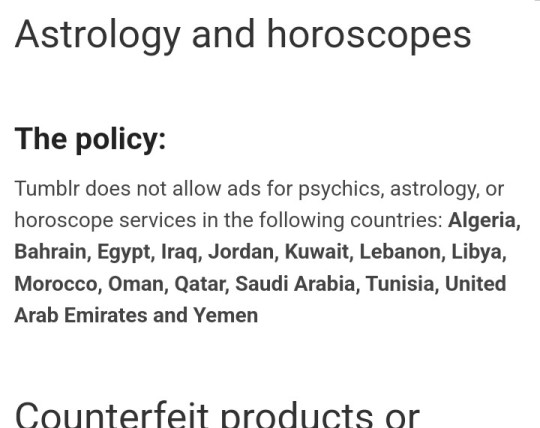
I love reading fine print
#the actual tumblr terms of advertising contain the word 'fuck' twice#all im hearing is the US is a ripe market for scams i mean ripoffs i mean astrologists & fortune tellers#didnt at all expect this to get notes so rbing to avoid this turning into 'why are islamic countries weeeeird'#i just wanted to point out that its technically legal in the US 🤷♂️
1K notes
·
View notes
Text

ok I've been teasing about this comic a long time if you're interested you can save the page!
#im not gonna explain all the marketing stuff that went into this decision but like#basically. I don't like posting art of them and not having something to link people if theyre interested...#anyways genuinely like dont worry too much about getting to it its literally just if youre interested and do want to read it#cause its just extremely hard to get people in on something RIGHT when it launches#unless you're. yknow. webtoon. and have access to a ton of money#and I really want my TTA audience to be able to move over to it if theyre interested!#theres more to it than this but basically. I will not be like advertising this cause I'm not even POSTING There#I literally just want to have a link I can append to the art I'm already sharing#thats all. anyways carry on#we were legion#oh but I did wanna share the link like once cause I know some people are interested#ok back to work#got like 10 days til return! its so soon!
74 notes
·
View notes
Note
Why'd you change the title of yesterday's video? You don't need to insult yourself.
Transparentengineerpirate, there is something you need to know about me. I do not exist to be happy or good or self-congratulatory or self-deprecating or whatever else.
I exist to sell coffee and socks that donate 100% of their profit to charity.
I am a machine that inputs food and oxygen and water and outputs sock and coffee marketing and other excreta.
And so when I noticed that by changing the title to something negative I could get around 800 more views per hour, I did so, because I am a moth that flies toward the light of more awesome sock and coffee-related impressions.
764 notes
·
View notes
Text
the official nintendo youtube channel shadowdropping a video that's just ten seconds of a creepypasta man standing in front of a closet followed by the nintendo logo feels like a scott the woz bit. i can't explain why. but it just does.
#seriously what marketing intern cooked this one up#because i wanna kiss them on the lips#what are you even advertising here mr mario#nintendo#emio#nintendo emio#koolmathgames.com
102 notes
·
View notes
Text
Thursday, August 3.
vintage ads.
Capitalism: bad. Vintage ads: good.
Or so dictates the paradoxical logic that we have decided for ourselves, and when the question is this awkward, the answer is obvious: to stick our collective heads in the sand and simply enjoy the pretty things. And goodness, they are pretty. The problems with advertising, and its seductive evils, are laid bare by this selection of ads handpicked from the dashboard. The common thread between all of these ads is that they have been produced by corporations whose end goal and very purpose is to convince you (against your better judgment, or circumstances) to spend your money (money which you need) on their products (products which you don't—and possibly can't really afford.)
Similarly demonstrated, however, is the irresistible nostalgic glamour. Perhaps when contemporary advertising tries so hard to be a meme, or be funny, or be quirky and off-beat (or perhaps more simply put, tries too hard) there is a genuine allure in classic adverts that, even now, feel so effortlessly stylish. This effortlessness is also paradoxical because, like the products they often advertise, they are the result of hard work, time, dedication, from those at the peak of their craft. Like these products, they were made for leisurely, long-term use and enjoyment, and not to be so quickly consumed and discarded. What we're really saying, I suppose, is when #advertising is this slick, and pleasing to the eye, we must simply ask that you be quiet, promptly, and accept our money.
And remember, folks, one eye on the pretty ads, the other guarding your piggy banks x
#today on tumblr#vintage ads#vintage advertising#vintage advertisement#advertising#ads#marketing#vintage#70s vintage#capitalism#anti capitalism#the one ring#willpower#branding
546 notes
·
View notes
Text









rough sketches → drafts → final drawings
gege akutami's jujutsu kaisen exhibition promotion in shibuya station!
#jujutsu kaisen#how tf they never miss with the marketing#smn quoted on twt#"man the power this cat hold in his hands is insane#“he could literally drop some ink on a paper and these ppl will advertise it in the most busiest of jpn landmarks like its holy grail lol”#HARD AGREE
119 notes
·
View notes